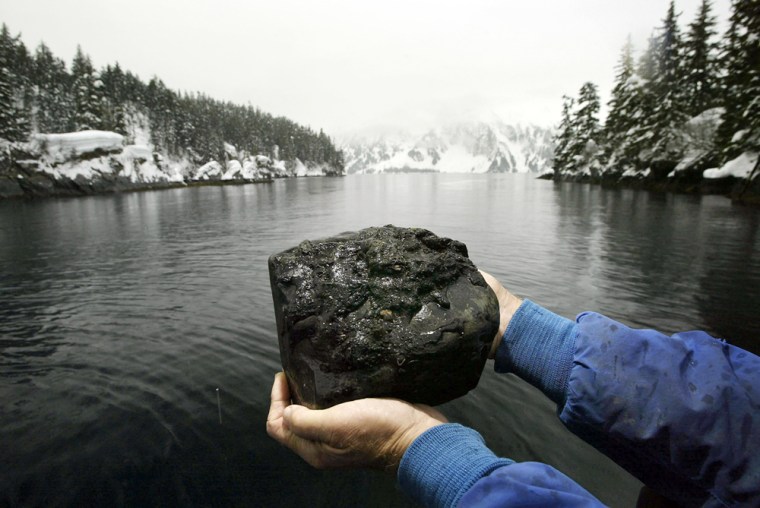Lingering crude from the nation’s largest oil spill has weathered only slightly in some places almost 18 years after the tanker Exxon Valdez ran aground and fouled hundreds of miles of Alaska shoreline, a new federal study released Wednesday concludes.
The estimated 85 tons — or more than 26,600 gallons — of oil remaining at Prince William Sound is declining about 4 percent a year and likely even slower in the Gulf of Alaska, according to research chemist Jeffrey Short of the National Oceanic and Atmospheric Administration.
At that rate of decline, oil could persist for decades below the surface of some beaches, Short and colleagues said in their report.
The study is to be published in the Feb. 15 edition of Environmental Science & Technology, the journal of the American Chemical Society.
“Such persistence can pose a contact hazard to intertidally foraging sea otters, sea ducks, and shorebirds, create a chronic source of low-level contamination, discourage subsistence in a region where use is heavy, and degrade the wilderness character of protected lands,” researchers wrote in their conclusion.
The study was partially funded by the Prince William Sound Regional Citizens’ Advisory Council, which was formed by federal mandate after the Exxon Valdez spill to monitor industry operations. Researchers, however, said their findings and conclusions were not influenced by that sponsorship.
Company sees 'nothing newsworthy'
Exxon Mobil Corp. spokesman Mark Boudreaux said the Irving, Texas-based company’s Valdez team planned to closely review the findings.
“Based on our initial review of the report, there is nothing newsworthy or significant in the report that has not already been addressed,” he said. “The existence of some small amounts of residual oil in Prince William Sound on about two-tenths of 1 percent of the shore of the sound is not a surprise, is not disputed and was fully anticipated.”
Boudreaux said Exxon has supported more than 350 independent studies whose scientists have found no evidence of significant long-term impact from the spill.
The Exxon Valdez ran aground March 24, 1989, emptying 11 million gallons of crude oil into Prince William Sound. The spill contaminated more than 1,200 miles of shoreline and killed hundreds of thousands of seabirds and marine animals.
Short and the other researchers looked at subsurface oil from 10 randomly selected beaches in the spill area. Data from the study was collected in 2005 and compared with samples taken from the same beaches for a 2001 study.
Earlier research from other spills showed that oil could hold toxins for years if embedded in oxygen-depleted sediments where minimal weather-caused disintegration occurs, according to the new report. In the Valdez spill study, researchers found that thick, emulsified oil — called “oil mousse” — resists weathering and thus can be preserved in oxygen-containing sediments.
'There a long time'
“Our results show it’s not changing much,” Short said. “What’s left is going to be there a long time.”
Exxon estimates it has paid $3 billion in cleanup costs, government settlements, fines and compensation. But it still has not paid an unresolved punitive damage judgment, originally set for $5 billion by a federal jury in 1994.
The case has since bounced between the federal court and the 9th U.S. Circuit Court of Appeals. In December, the appeals court ruled that the oil giant must pay $2.5 billion to compensate thousands of fishermen and others affected by the spill.
Earlier this month, Exxon asked the court to reconsider its decision.
John Devens, executive director of the Prince William Sound Regional Citizens’ Advisory Council, said Exxon’s prolonged stalling were unconscionable considering the social, economic and environmental damages.
“It’s very difficult to understand why Exxon isn’t a better industrial citizen,” Devens said.
